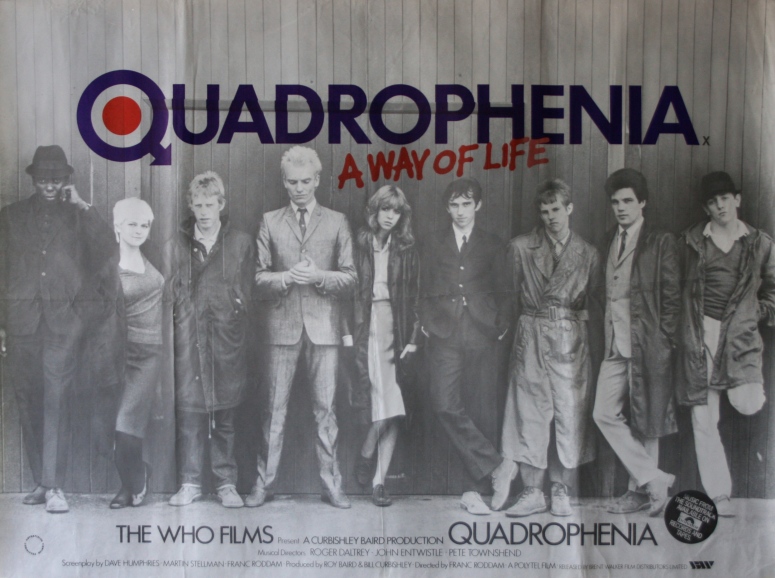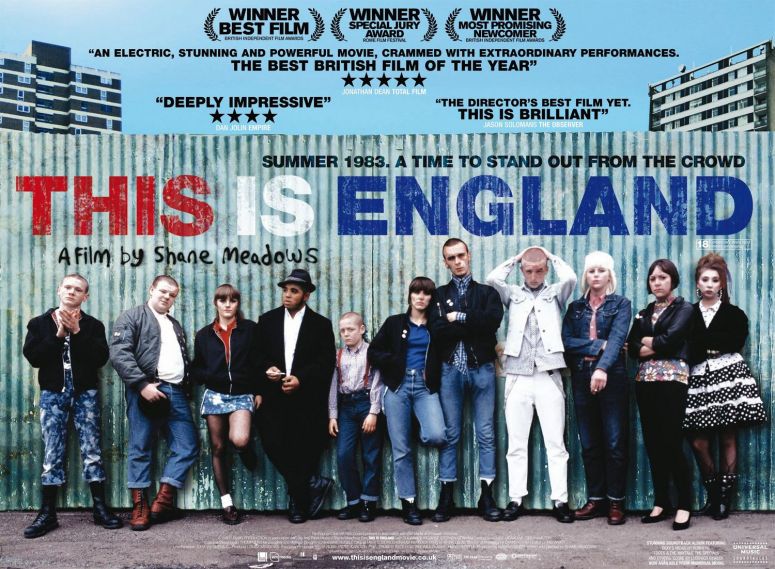Dir: Franc Roddam, 1979
7/10

Is this a pitch-perfect account of what it’s like to be a misunderstood teenager, or a wallow in the depiction of yob culture?
Jimmy Cooper (Phil Daniels) is a working class mod and heavily into the culture.
With his friends, he indulges in booze, pill popping and scrapping with the enemy, the rockers.
Angry and disenchanted, Jimmy is becoming wary with the mod life and a series of setbacks make him realise that being a mod isn’t “a way of life”.
Based on The Who’s 1973 double album of the same name, Quadrophenia is the de facto youth film.
A cult from release, the film superbly portrays the need for acceptance that teens and young adults often feel, while also showing the waste of life that anger and destruction is.
Of course, the irony in the concept isn’t lost on Roddam; that Jimmy doesn’t want to be the same as everybody else so is a mod, which makes him the same as all the other mods and, therefore, not an individual.
The film asks the question, “is there, really, such a thing as individuality?”
Unlike Ken Russell’s adaptation of The Who’s earlier album Tommy, this is not a musical. Some re-recorded songs by the band themselves, help to drive the narrative concerning Jimmy’s frame of mind.
Quadrophenia was the result of a more mature and confident Pete Townshend. Where Tommy was light and pop-like, the 1973 LP was pure rock and had a rigid and coherent story.
The Who’s contribution to the soundtrack is a selection of songs, rather than the entire album, with The Real Me being a standout. Set to Jimmy riding through the streets of London on his Lambretta while the credits run, the song, literally, kicks in with Townshend’s heavy Gibson Les Paul guitar blasting the speakers apart.
Produced by The Who’s film company, Who Films, Roddam’s picture is notable for a cast then went on to become notable in their own right. Perennial lisper Toyah Willcox appears as Monkey before she shot to fame as a singer with It’s A Mystery. Mark Wingett, later became a prominent player in the ITV soap The Bill. Leslie Ash gained fame as Deborah, the sexy next door neighbour in Simon Nye’s sitcom Men Behaving Badly and, after receiving lip injections and making her look like a fish, earning herself the moniker, Trout Pour.
But, most famous of all is Sting, playing Ace Face, the coolest mod in Britain and an icon for the followers.
Controversially, the British censors awarded the film an ‘X’ certificate, forbidding any person under the age of 18 to see it.
This was, in part, due to the ripe language and liberal uses of “fuck” and, the even more offensive, “cunt”. Bridled with the pill popping and anti-social behaviour exhibited by the characters, there is no, real, negative aspect to any of this, firmly supporting the case for the restricted rating.
This did cause a little bit of upset, though, as it was felt that the film was aimed at a teenage demographic but, with the highest category awarded to it, limited the target audience.
Franc Roddam has created a truly unique and gritty film, that is grounded in reality. Despite its fictional origins, the brawl on Brighton beach did, genuinely, take place in the sixties.
Both Townshend and Roddam have ably demonstrated a flair for true storytelling; the guitarist through the music and the director through the lens.
Primarily a film about mods, Roddam doesn’t condone the lifestyle as we see in the friendship between Jimmy the mod and Kevin the rocker (Ray Winstone), two rivals that can also be friends. A wonderful piece of characterisation, this highlights the futility of anger and the redundancy of fighting.
A pivotal point in the film, as it shows Jimmy’s fear of not being part of the mods but also cherishing life and relationships.
But, regardless of its accolades, it’s not a movie that can be watched over and over. Cynical and downbeat for most of the running time, you leave the film feeling deflated despite its optimistic ending.
Over the years, this seminal film has made an impact on directors and contemporary artists the world over. Hugely influential, many filmmakers have taken inspiration from the films look and design. Shane Meadows’ 2006 drama, This Is England, clearly takes its mark from the iconic poster. Take a look:

Quadrophenia is a perfect blend of The Who and British filmmaking, producing a youth film of a bygone era, that will resonate with those that were there and provide a time machine for those that weren’t.
